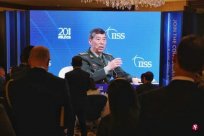Compared with the sovereign dispute in the South China Sea, Dr. Huang Yonghong, the Minister of Defense, believes that the situation in Northeast Asia is more worried, because there are several powerful countries in that area, including China, Japan, South Korea, and North Korea with nuclear weapons and nuclear weapons.The existence of "flames will be much larger."
In Huang Yonghong's view, the South China Sea dispute has lasted for a while, but Vietnam, the Philippines, Brunei, Malaysia, and China still maintain the relationship with each other, and the channels that can cool down the situation still exist.Essence
For example, Asia Dan'an and China are negotiating for the formulation of the South China Sea Code, China also promises to try to find a way to solve problems together.
Improvement in Japan and China is the most important thing that can do for Asian San'an
Huang Yonghong Sunday (June 4th) At the last plenary session of the 20th Shangri -La dialogue, when asked what Japan could do more for regional security, he proposed his concerns about the situation in Northeast Asia.The summary interview further illustrates the reason.
The United States, Japan and Australia also issued a joint statement on a three -side statement at the incense venue in 2022 to express their attention to the situation in the East China Sea and the South China Sea.A much less.
Asked how Japan can promote regional security -from the position of Asianianan and Singapore, Huang Yonghong said at the plenary session: "In Asia, the most important thing that Japan can do for Asian Simpa is to improveRelationship with China. "
There are also some "unsolved hostility"
He believes that there are some "unresolved hostility" in Japan and the country, which lurk under the surface.In order to maintain geopolitical stability, the better the relationship between Japan and China, the more room for turns when these unsolved hostility floats on the table.
Secondly, as Japan has done in the past few decades, Japan should have more actions, so that other countries have reassuring Japan's militaryization and development; third, continue to participate in regional affairs on multilateral occasions.
When Japanese Prime Minister Kishita Tianshi delivered a keynote speech last year, he announced that Japan would improve Japan's diplomatic and security role in this region through "Kishida Peace Vision".He has actively promoted the expansion policy of the army for more than the year, and has finalized the plan to double the defense budget within five years.By 2030, Japan's military expenditure is expected to be equivalent to France, about $ 60 billion.
Huang Yonghong said that Singapore accepted Japan to play a more important role in regional security, but he also reminded: "We have never encountered so much situation in Japan in national defense.I feel at ease with China, pay more attention in this respect, this is good for them. "
On the other hand, the United States and Canadian warships met the Chinese Navy when crossing the Taiwan Strait on Saturday. The United States afterwards criticized the Chinese warships by bypassing the American destroyer in a "unsafe" manner.
When talking about whether Singapore pays attention to this incident, Huang Yonghong said that it is not just Singapore. When there is a "huge or fast -moving object" approaching the other country, all countries will pay attention to it.He applied a sentence in Fujian, saying "hitting a sound", which means that there is a big collision. When a loud noise is made, it means a problem.
He believes that it can be reminded that China and the United States are in principle supporting the rules of coastal of the sea accident (CUES) and the Guidelines on Air Milital Encounters (GAME).
According to Cues, when the warship meets at sea, it should be sailed in the opposite direction. Once the direction is wrong, it will collide.These two criteria are the protective fences that avoid accidents.Huang Yonghong also mentioned in the concluding interview that China and the United States can dismiss the dispute or cooling of the protective fences one by one, which is worried about many countries.
This session has ended. A total of 571 representatives from 54 countries attended the conversation of this Shangri -La, including 48 ministerial representatives.


